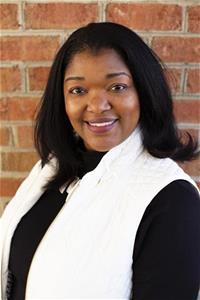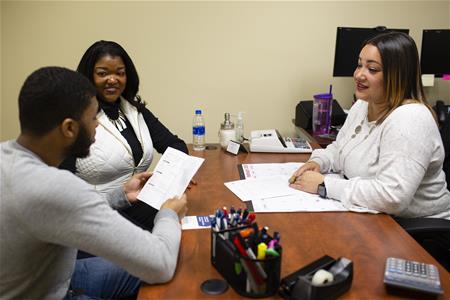
Self-Help's lending offices aren't open now, but that doesn't mean we aren't lending. Like many at Self-Help these days, our loan officers are working from their homes, spending long days processing loan applications, responding to questions, and offering guidance to members and potential home buyers.
Recently we talked to Self-Help’s Director of Mortgage Originations, Shondra Tanner, who answered questions about current lending processes, underwriting guidelines, and her personal passion for helping future homeowners.
What is different about our mortgage lending today?
The COVID-19 epidemic has definitely changed the ways we are offering loans. Prior to COVID, we were doing almost everything face-to-face. Now we’re relying more on electronic applications, digital signatures, and we have much more contact by email and phone. It has been a big change in a short time, but our members and borrowers have adapted amazingly well.
The other big change, and this is a hard one, is that homeownership is a dream deferred for many families who had been close to making this goal. Given the unemployment and job instability, we know that many people who want to buy a home simply can’t think about it right now. We’ve heard from members who have set aside savings to purchase a home, but who now need to use those savings simply to stay afloat.
In spite of current conditions, people are continuing to buy homes, and Self-Help’s home lending is now reaching pre-COVID levels. Many of our applications are coming from essential workers, people who work in places like grocery stores and hospitals, and also from self-employed people who are providing goods and services that are in demand.
Is it harder to qualify for loans now?
The guidelines have remained the same for people who have uninterrupted income. Our minimum credit score is 580, and for people who don’t have traditional credit, we still accept alternative documentation, like utility bills. For folks who have been laid off or without work for a while, lenders have tightened their guidelines and are taking additional steps to verify employment and the continuation of income. They may still qualify for a mortgage, but it is likely to be a lower-priced home than they had envisioned.
Is Self-Help still offering down payment assistance?
Yes, we are! We still offer down payment assistance through the Federal Home Loan Bank of Atlanta, and we are continuing to work with several partners who provide assistance to home buyers.

Shondra visits loan officer Sharita Hines (right) at Self-Help's Raleigh branch along with Jajuan Monroe (left), Self-Help's Online Content Specialist.
I’m passionate about home lending and seeing people reach the American dream of homeownership. The people we serve basically just need to be given a chance and sometimes need someone to take a little more time with them. Our loan officers are not commission-based, so we can take more time to do some of the hand-holding that first-time home buyers often need. Our entire team is passionate and committed to our borrowers. That’s what makes us strong.
I’ve always loved working directly with people who are determined to buy their own home. Sometimes it’s hard, but then I see results, or at least new hope. Just last week I talked to a woman who had already gone to several different lenders, but was turned away because she has $160,000 in student loan debt. I talked to her for nearly an hour to find out more about her situation, and I made some suggestions. Later she sent me this email:
“Ms. Tanner, you changed my life. The advice you gave me gives me hope that I will become a homeowner.”
That’s what keeps me going.
3 Essential Tips for First-Time Home Buyers
Know your credit score (and be sure it’s accurate).
If you want to become a homeowner, the first thing you have to do is check your credit so you see exactly what’s on your report. Some credit scores available online aren’t accurate or complete. When pursuing your first home, it’s best to consult with a mortgage lender early in the process and let them access your credit report so you’re seeing the same information.
Savings are essential.
Even if you qualify for down payment assistance, you will need savings to pay for up-front costs. Such costs include things like a property appraisal, earnest money and home inspection. Altogether, up-front costs can amount to $2,000 or more.
Avoid disappointment: Be realistic about what you can afford.
Before you do any serious house shopping, it’s a good idea to know what you can afford. Real estate prices have skyrocketed in some areas, making it more difficult to find an affordable home. Even if you have a good income, your debts also affect the size of your mortgage loan. We can help calculate the maximum house payment you can afford given other debt obligations.
* * *
More tips, free resources, and free financial counseling are available from our partner GreenPath Financial Coaching.
Ready to apply for a loan? Click here to access a print-and-mail application.